Introduction
Overcoming vulnerability can be a challenging process for many individuals. The fear of being emotionally exposed or judged can hinder personal growth and prevent meaningful connections with others. However, by implementing specific strategies, it is possible to overcome this fear and embrace vulnerability gradually. This article will explore six tips to help individuals navigate their fear of exposure and develop a more authentic and fulfilling life.

1. Understanding the Root Causes of Fear of Vulnerability
Overcoming vulnerability is often seen as a weakness, something to be avoided at all costs. It is the fear of being emotionally exposed, of letting others see our true selves. This fear can be deeply ingrained in our psyche, stemming from various root causes. Understanding these root causes is the first step toward overcoming the fear of vulnerability.
One of the main reasons people are afraid of being vulnerable is the fear of rejection. We worry that if we show our true selves, others may not accept or even ridicule us. This fear of rejection can be traced back to childhood experiences, where we may have been criticized for vulnerability. These early experiences can create a lasting fear that carries into adulthood.
Another root cause of the fear of vulnerability is the fear of judgment. We worry that others will judge us harshly if we open up and show our true selves. This fear of assessment can be fueled by societal expectations and the pressure to conform to specific standards. We may fear being seen as weak or inadequate if we reveal our vulnerabilities.
Past traumas can also contribute to the fear of vulnerability. If we have experienced betrayal or emotional pain in the past, we may develop a fear of being hurt again. This fear can make us hesitant to open up and be vulnerable with others, as we want to protect ourselves from potential harm. The fear of vulnerability becomes a defense mechanism to shield ourselves from further pain.
Low self-esteem is another root cause of the fear of vulnerability. When we don’t feel good about ourselves, we may believe our vulnerabilities make us unworthy of love and acceptance. We may fear that if others see our true selves, they will see our flaws and reject us. This fear can be deeply ingrained and prevent us from forming deep and meaningful connections with others.
Cultural and societal norms can also influence the fear of vulnerability. In some cultures, vulnerability is seen as a sign of weakness and is discouraged. We may internalize these beliefs and fear vulnerability because we don’t want to be seen as weak or inferior. These societal expectations can create a fear of vulnerability that is difficult to overcome.
Lastly, the fear of vulnerability can be perpetuated by our negative self-talk. We may have internalized negative beliefs about exposure, telling ourselves that it is a sign of weakness or that we will be taken advantage of if we show our true selves. This negative self-talk reinforces our fear and makes it even harder to overcome.
Understanding the root causes of the fear of vulnerability is essential to overcoming it. We can challenge and change our beliefs by recognizing where our fear stems from. It is important to remember that vulnerability is not a weakness but a strength. It takes courage to be vulnerable and to show our true selves to others. By embracing vulnerability, we can form deeper connections, experience greater intimacy, and live more authentically.
2. Strategies to Build Self-Acceptance and Self-Worth
Embracing vulnerability can be a tool for personal growth and building stronger connections with others. This will exp six practical strategies to help you overcome the fear of vulnerability and develop a greater sense of self-acceptance and self-worth.
1. Recognize the Benefits of Vulnerability
The first step in overcoming vulnerability is knowing of its benefits. When we allow ourselves to be vulnerable, we create opportunities for deeper connections with others. By sharing our true thoughts and feelings, we invite others to do the same, fostering trust and intimacy. Additionally, the vulnerability allows us to learn from our mistakes and grow. Embracing vulnerability is a courageous act that can lead to personal and professional success.
2. Challenge Negative Beliefs
Fear of vulnerability often stems from negative beliefs about ourselves and how others perceive us. It is important to challenge these beliefs and replace positive and realistic ones. Remind yourself that everyone has vulnerabilities and that it is a natural part of being human. Recognize that vulnerability is not a sign of weakness but rather a sign of strength and authenticity.
3. Start Small
Overcoming the fear of vulnerability does not mean diving headfirst into the most profound and personal aspects of your life by sharing your thoughts or feelings with someone you trust. This could be a close friend, family member, or therapist. Gradually increase the level of vulnerability as you become more comfortable. You can build confidence and develop a greater sense of self-acceptance by taking small steps.
4. Practice Self-Compassion
Self-compassion is crucial when it comes to overcoming vulnerability. Treat yourself with kindness and understanding, just like a close friend. Acknowledge that exposure can be uncomfortable and that it is okay to feel scared or uncertain. Remember that you are worthy of love and acceptance, regardless of your vulnerabilities.
5. Surround Yourself with Supportive People
Building self-acceptance and self-worth requires a supportive network of people who accept and appreciate you for who you are. Surround yourself with individuals who encourage vulnerability and create a safe space to express yourself. Seek out relationships that are based on empathy and mutual respect. A solid art system can help you overcome the fear of vulnerability and reinforce your sense of self. Embrace Imperfection
Perfectionism often goes hand in hand with the fear of exposure. We may fear being judged or rejected if we are not perfect in every way. However, it is essential to remember that nobody is perfect. Embrace your imperfections and recognize that they are what make you unique and human. Allow yourself to make mistakes and learn from them. By accepting your weaknesses, you can relinquish the need for constant validation and develop greater self-acceptance.
In conclusion, overcoming the fear of vulnerability is a journey that requires self-reflection, self-compassion, and practice. By recognizing you can build self-acceptance and self-worth through the benefits of openness, challenging negative beliefs, starting small, practicing self-compassion, surrounding yourself with supportive people, and embracing imperfection, you can see vulnerability is not a weakness but a strength that can lead to personal growth and deeper connections with others.
3. Cultivating Emotional Resilience
The fear of being exposed and showing our true selves to others keeps us from forming deep connections and experiencing true intimacy. However, cultivating emotional resilience can help us overcome this fear and embrace vulnerability as a strength. This article will exp six tips to help you overcome the fear of vulnerability and cultivate emotional resilience.
Firstly, it is essential to recognize that vulnerability is not a sign of weakness but a sign of strength. When we allow ourselves to be vulnerable, we show courage and authenticity. It takes power to let down our guard and open ourselves up to the possibility of rejection or hurt. By reframing vulnerability as a strength, we can begin to see it in a more positive light and overcome our fear.
Secondly, it is crucial to practice self-compassion. Our fears often stem from a fear of judgment or criticism from others. However, by practicing self-compassion, we can learn to be kind and understanding towards ourselves, even in moments of vulnerability. Remind yourself that it is okay to make mistakes and that you deserve love and acceptance, regardless of your vulnerabilities.
Next, building a support network of trusted individuals who can provide a safe space for you to be vulnerable is essential. Surround yourself with people who are empathetic, non-judgmental, and supportive. Having a support network can help alleviate the fear of vulnerability, as you know you have people who will be there for you, no matter what.
In addition, it is essential to practice self-awareness. Take the time to reflect on your emotions, thoughts, and behaviors. By understanding yourself better, you can identify any patterns or triggers contributing to your fear of vulnerability. Self-awareness allows you to take control of your emotions and make conscious choices about how you want to respond in vulnerable situations.
Furthermore, it is essential to set boundaries. While vulnerability is vital for building connections, it is equally important to protect yourself from harm. Set clear boundaries for yourself and communicate them to others. By setting boundaries, you can feel more secure in your vulnerability, knowing you have control over how much you share and with whom.
Lastly, practice gratitude. Cultivating gratitude can help shift your focus from fear to appreciation. Take the time each day to reflect on the things you are grateful for, whether it be the support of loved ones or the growth opportunities that vulnerability brings. By practicing gratitude, you can cultivate a positive mindset and overcome the fear of exposure.
In conclusion, overcoming the fear of vulnerability requires cultivating emotional resilience. By reframing vulnerability as a strength, practicing self-compassion, building a support network, practicing self-awareness, setting boundaries, and practicing gratitude, you can embrace vulnerability and form deeper connections with others. Remember, vulnerability is not a weakness but a sign of strength and authenticity. Embrace it, and you will find that it opens doors to a more fulfilling and meaningful life.
4. Overcoming Vulnerability by Building Authentic Relationships
Authentic relationships are built on trust, openness, and vulnerability. When we allow ourselves to be vulnerable, we create a space for deeper connections and meaningful interactions. However, many people struggle with the fear of vulnerability, as it requires us to expose our true selves and potentially face rejection or judgment. In this article, we will explore six tips to overcome the fear of vulnerability and embrace the power of authentic relationships.
Firstly, it is essential to understand that vulnerability is not a sign of weakness but rather a strength. When we allow ourselves to be vulnerable, we show our true selves and invite others to do the same. This authenticity creates a foundation of trust and understanding, which is esse building genuine connections. Reframing vulnerability as a courageous act, we can overcome our fear and embrace its power.
Secondly, it is crucial to recognize that everyone experiences vulnerability. We are all human beings with our insecurities and fears. Understanding that vulnerability is a universal experience can help us feel less alone in our struggles. By acknowledging that others also face vulnerability, we can create a sense of empathy and compassion, which can further strengthen our relationships.
Next, it is essential to practice self-acceptance and self-compassion. The fear of vulnerability often stems from a fear of being judged or rejected. By cultivating self-acceptance and self-compassion, we can develop a sense of worthiness and confidence in ourselves. When we believe in our values, we are more likely to take risks and be vulnerable in our relationships.
Another tip to overcome vulnerability fears is to start small. Rather than diving headfirst into deep emotional conversations, begin by sharing minor aspects of yourself with others. This could be as simple as expressing your preferences or sharing a personal story. By gradually increasing your vulnerability, you can build trust and confidence in your ability to be open with others.
Additionally, it is essential to surround yourself with supportive and trustworthy individuals. Building authentic relationships requires a safe and non-judgmental environment. Seek out people who value vulnerability and are willing to reciprocate it. You can create a network that encourages and embraces openness by surrounding yourself with supportive individuals.
Lastly, practicing active listening and empathy in your relationships is essential. When someone opens up and shares their vulnerabilities with you, providing a safe space for them to be heard and understood is vital. Practice active listening by giving your full attention, maintaining eye contact, and validating your feelings. Demonstrating empathy and understanding can foster a deeper connection and encourage others to be vulnerable.
In conclusion, vulnerability is a powerful tool in building authentic relationships. By reframing vulnerability as a strength, recognizing its universality, practicing self-acceptance, starting small, surrounding yourself with supportive individuals, and practicing active listening and empathy, you can overcome the fear of vulnerability and embrace its power. Authentic relationships are built on trust and openness; vulnerability is the key to unlocking their full potential.
5. Embrace Growth and Personal Development
Vulnerability is often seen as a weakness, something to be avoided at all costs. It is the fear of being exposed, of showing our true selves to others. However, embracing vulnerability can be a robust personal growth and development tool. It allows us to connect with others on a deeper level, to build stronger relationships, and to indeed be ourselves. If you struggle with the fear of vulnerability, here are six tips to help you overcome it.
Firstly, it is essential to understand that vulnerability is not a sign of weakness but rather a sign of strength. It takes courage to be vulnerable, to let down our guard, and to show our true selves to others. By embracing vulnerability, we offer that we are confident in who we are and willing to take risks. Remember, vulnerability is not about seeking validation from others but about being aware and authentic to ourselves.
Secondly, it is crucial to recognize that everyone experiences vulnerability. We are all human and have our insecurities and fears. Understanding that vulnerability is a universal experience can help to normalize it and make it feel less daunting. When we realize that we are not alone in our vulnerability, it becomes easier to open up and share our true selves with others.
Next, it is essential to practice self-compassion. The fear of vulnerability often stems from a fear of judgment or rejection. We worry about what others will think of us if we show our true selves. However, it is essential to remember that we are our own harshest critics. Instead of being so hard on ourselves, we need to practice self-compassion and remind ourselves that we are worthy of love and acceptance just as we are. By being kind to ourselves, we can begin to let go of the fear of vulnerability.
Another tip for ways to overcome vulnerability fears is to start small. Rather than diving headfirst into a vulnerable situation, begin by taking small steps. Share something personal with a trusted friend or family member, or express your feelings in a safe and supportive environment. As you become more comfortable with vulnerability, you can take considerable risks and open up to others more significantly.
Additionally, it is essential to surround yourself with supportive and understanding people. Not everyone will be receptive to vulnerability, and that is okay. Seek out those who are willing without judgment and who will support you in your journey towards embraceability. A robust support system can make all the difference in overcoming the fear of vulnerability.
Lastly, it is crucial to remember that vulnerability is a process. It takes time and practice to become comfortable with being vulnerable. Be patient with yourself and celebrate each small step you take towards embracing vulnerability. Remember that growth and personal development are not linear, and setbacks are a natural part of the process. By staying committed to your journey, you will gradually overcome the fear of vulnerability and experience the many benefits it brings.
In conclusion, overcoming the fear of vulnerability is a decisive step towards personal growth and development. By recognizing vulnerability as a sign of strength, normalizing it, practicing self-compassion, starting small, surrounding yourself with supportive people, and embracing vulnerability as a process, you can overcome your fear and unlock a world of deeper connections and authenticity. Embrace vulnerability, and watch as your life transforms for the better.
Conclusion
In conclusion, overcoming the fear of vulnerability can be challenging, but it is essential for personal growth and building meaningful connections. By practicing self-compassion, embracing imperfections, setting healthy boundaries, seeking support, reframing negative thoughts, and gradually exposing themselves to vulnerability, individuals can gradually overcome their fears and experience the benefits of authentic and fulfilling relationships.










